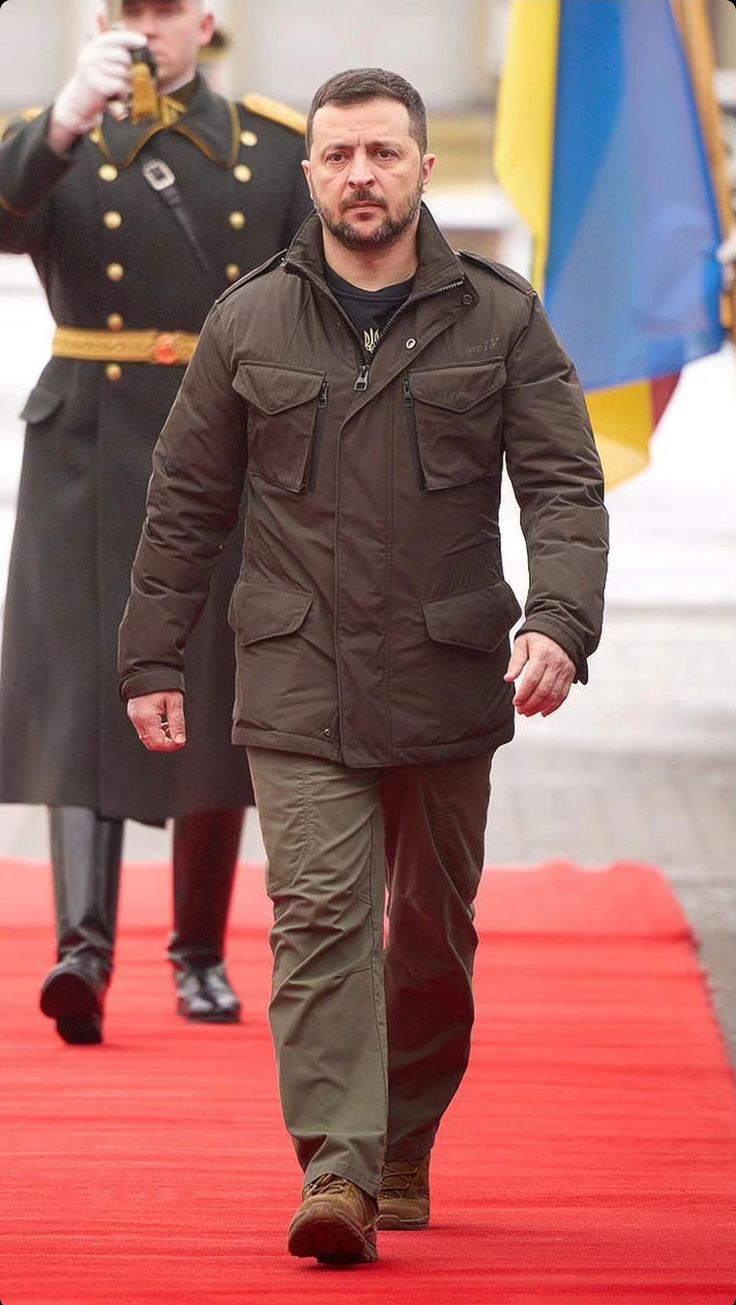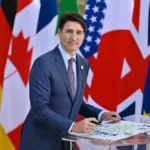Volodymyr Zelensky 2025: President of Ukraine
Full Name: Volodymyr Oleksandrovych Zelensky
Born: January 25, 1978, Kryvyi Rih, Ukraine (then part of the Soviet Union)
Nationality: Ukrainian
Political Party: Servant of the People (Sluha Narodu)
Office: President of Ukraine (2019–present)
Previous Career: Comedian, Actor, Producer, Television Producer
Early Life and Education: Volodymyr Zelensky
Volodymyr Zelensky was born in Kryvyi Rih, a city in central Ukraine, to a Jewish family. His father was a prominent professor in the field of cybernetics, and his mother worked as an engineer. Zelensky grew up in a modest household and showed an early interest in the arts, particularly in acting and theater.
Zelensky attended the Kyiv National Economic University, where he earned a degree in law. Despite his legal background, he pursued a career in entertainment, beginning his work in comedy and television production. His education and early career shaped him as someone who was familiar with both the entertainment industry and the broader societal issues, which would later influence his political approach.
Rise to Fame: Entertainment Career: Volodymyr Zelensky
Before entering politics, Zelensky achieved immense popularity as a comedian, actor, and television producer. He co-founded Kvartal 95, a production company that became one of the most successful comedy and entertainment brands in Ukraine. Through Kvartal 95, Zelensky rose to national prominence with his appearances on the popular television show “Servant of the People”, where he played a high school teacher who unexpectedly becomes the president of Ukraine.
The show was a massive hit, and Zelensky’s portrayal of an honest, uncorrupted leader who stood up against the oligarchs and political elites resonated deeply with the Ukrainian public. The series’ popularity catapulted him to fame as a symbol of change and anti-corruption, which later played a key role in his presidential campaign.
Political Career: Election and Presidency: Volodymyr Zelensky
2019 Presidential Election: Volodymyr Zelensky
In 2018, Zelensky made the unexpected decision to transition from the entertainment industry into politics. He announced his candidacy for the 2019 presidential election, running as the candidate for the newly formed Servant of the People political party, named after his television show. His campaign was largely centered around his promises to fight corruption, reduce the influence of oligarchs, and bring a fresh approach to Ukraine’s leadership.
Zelensky’s presidential run was characterized by his outsider status, as he had no prior political experience. His campaign appealed to voters disillusioned by the entrenched corruption of Ukraine’s political establishment. His message of “change” and “transparency” resonated with a broad cross-section of the electorate, particularly among younger voters and those dissatisfied with the status quo.
In the first round of voting, Zelensky received an overwhelming 30% of the vote, securing a spot in the runoff against the incumbent president Petro Poroshenko. In the second round, Zelensky won a landslide victory, securing 73% of the vote, while Poroshenko garnered just 25%. His decisive win marked a significant shift in Ukraine’s political landscape, as voters chose an anti-establishment figure over the traditional political elite.
Presidency: Leadership and Reforms: Volodymyr Zelensky
Zelensky took office as Ukraine’s 6th president on May 20, 2019, at the age of 41, and quickly set about fulfilling his campaign promises. His presidency has been characterized by several key themes:
1. Anti-Corruption and Reform; Volodymyr Zelensky
One of Zelensky’s main campaign promises was to fight corruption, which has plagued Ukraine for decades. He established a reputation for tackling Ukraine’s political elite and working to root out corruption within government institutions. Zelensky pushed for significant judicial reforms, including judicial vetting processes to ensure that judges are not influenced by corrupt interests. His administration has made progress on reforms to government transparency, although challenges remain.
Zelensky also set up a new anti-corruption court to address cases of high-level corruption and to improve the functioning of the justice system. He has been active in trying to reduce the influence of oligarchs on Ukraine’s political and economic systems, although this remains an ongoing struggle.
2. Economic Development and Recovery: Volodymyr Zelensky
Zelensky has prioritized efforts to improve Ukraine’s economy, focusing on economic growth, job creation, and foreign investment. His government has introduced land reforms, allowing citizens to sell agricultural land for the first time in decades, which was hailed as a significant step in modernizing Ukraine’s economy.
The Zelensky administration has also worked to improve Ukraine’s business climate by implementing digital government services, such as electronic public services for business registration and tax payments, aiming to reduce bureaucracy and foster entrepreneurship.
3. Foreign Policy and Relations with Russia: Volodymyr Zelensky
Zelensky’s foreign policy has been marked by a continued focus on Ukraine’s relationships with Western powers, particularly the European Union (EU) and NATO, while also addressing the ongoing conflict with Russia. Zelensky has advocated for deeper integration with the EU and NATO, with hopes of securing Ukraine’s future membership in both organizations.
Zelensky has also tried to address the ongoing conflict in eastern Ukraine with a more diplomatic approach. The war in the Donbas region began in 2014 after Russia annexed Crimea, and Russian-backed separatists have been fighting Ukrainian forces ever since. Zelensky has called for a peaceful resolution to the conflict, including proposing a prisoner exchange and pushing for renewed talks with Russia. However, the conflict remains unresolved, and Zelensky has struggled to find a lasting solution.
4. COVID-19 Response: Volodymyr Zelensky
Like many leaders around the world, Zelensky’s presidency was challenged by the COVID-19 pandemic. His government implemented strict lockdowns and quarantine measures to limit the spread of the virus. Zelensky has worked with international organizations and foreign governments to secure vaccines for Ukraine’s population, as the country faced significant hurdles in its vaccine distribution efforts.
5. Strengthening National Identity and Unity: Volodymyr Zelensky
Zelensky has sought to unite the country around a common national identity, transcending historical divides between Ukrainian-speaking and Russian-speaking regions. He has promoted Ukrainian language and culture, seeking to foster a sense of unity among Ukrainians in the face of both internal divisions and external threats.
In 2021, Zelensky signed a language law that emphasized the use of the Ukrainian language in the media, education, and public life, aiming to strengthen Ukrainian national identity in a country where Russian influence is still significant.
Challenges and Criticism: Volodymyr Zelensky
Zelensky’s presidency has faced several challenges:
- Corruption and Elite Resistance: Despite his promises to eradicate corruption, Zelensky has faced significant resistance from entrenched political elites and oligarchs. While his administration has introduced some reforms, challenges remain in fully dismantling the corrupt structures that have existed for decades.
- Handling of the War in the Donbas: The ongoing war in eastern Ukraine has been a persistent issue throughout Zelensky’s presidency. While he has made efforts to engage in dialogue with Russia, the conflict continues, and there are frustrations about the lack of progress toward a peaceful resolution.
- Economic Growth: While Zelensky’s government has taken steps to improve the Ukrainian economy, Ukraine remains one of the poorest countries in Europe, and the economic recovery has been slow. The pandemic has further strained the economy, making Zelensky’s economic reforms more difficult to implement.
Leadership during the Russian Invasion of Ukraine (2022-Present); Volodymyr Zelensky
One of the most defining moments of Zelensky’s presidency came in 2022, when Russia launched a full-scale invasion of Ukraine. Despite facing overwhelming military odds, Zelensky became an international symbol of resilience, determination, and national unity. He refused to leave Kyiv and remained in the capital to rally the Ukrainian people and fight for Ukraine’s sovereignty.
Zelensky’s leadership during the invasion has been widely praised, with his ability to mobilize international support for Ukraine’s defense and secure military and financial aid from Western countries playing a pivotal role in the country’s survival against Russian aggression.
His speeches have inspired not only Ukrainians but also people worldwide, with Zelensky becoming a symbol of resistance against tyranny. His diplomacy, particularly in urging Western countries to provide military support, has been central to Ukraine’s ability to defend itself.
Legacy and Future: Volodymyr Zelensky
Volodymyr Zelensky’s presidency is still ongoing, but his legacy is already being shaped by his response to the Russian invasion and his efforts to modernize Ukraine’s economy, politics, and international standing. His leadership has inspired millions and drawn attention to Ukraine’s struggle for sovereignty and democracy in the face of external threats.
Whether he can continue to navigate the challenges of war, corruption, and national unity remains to be seen. However, Zelensky’s ability to adapt, his willingness to take bold actions, and his unyielding commitment to Ukraine’s future have made him a pivotal figure in the country’s history.










